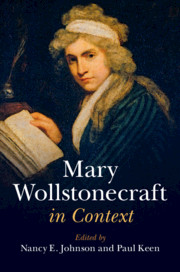Book contents
- Mary Wollstonecraft in Context
- Mary Wollstonecraft in Context
- Copyright page
- Contents
- Illustrations
- Notes on Contributors
- Preface
- Frontispiece
- Chronology
- Part I Life and Works
- Part II Critical Fortunes
- Part III Historical and Cultural Contexts
- The French Revolution Debate
- The Rights of Woman Debate
- Philosophical Frameworks
- Chapter 16 French Philosophes
- Chapter 17 Dissenters
- Chapter 18 Jean-Jacques Rousseau
- Chapter 19 Edmund Burke
- Chapter 20 William Godwin
- Chapter 21 Political Theory
- Chapter 22 Feminist Theory
- Legal and Social Culture
- Literature
- Suggested Further Reading
- Index
Chapter 19 - Edmund Burke
from Philosophical Frameworks
Published online by Cambridge University Press: 16 January 2020
- Mary Wollstonecraft in Context
- Mary Wollstonecraft in Context
- Copyright page
- Contents
- Illustrations
- Notes on Contributors
- Preface
- Frontispiece
- Chronology
- Part I Life and Works
- Part II Critical Fortunes
- Part III Historical and Cultural Contexts
- The French Revolution Debate
- The Rights of Woman Debate
- Philosophical Frameworks
- Chapter 16 French Philosophes
- Chapter 17 Dissenters
- Chapter 18 Jean-Jacques Rousseau
- Chapter 19 Edmund Burke
- Chapter 20 William Godwin
- Chapter 21 Political Theory
- Chapter 22 Feminist Theory
- Legal and Social Culture
- Literature
- Suggested Further Reading
- Index
Summary
Mary Wollstonecraft’s writings reveal a mind keenly interested in the politics of her day and well-read in the works of prominent political theorists of her time – Locke, Rousseau, “commonwealth men,” Scottish Enlightenment thinkers – whose ideas helped shape her political thought. Among these writers, none had quite the catalytic, galvanizing effect that Edmund Burke did in spurring her to articulate her political convictions and her feminist principles. Burke’s writings on the French Revolution, especially his Reflections on the Revolution in France (1790) and his early aesthetic treatise, An Enquiry into the Origin of Our Ideas of the Sublime and Beautiful (1757, 1759), challenged Wollstonecraft to formulate her views on key issues in eighteenth-century political thought, such as the basis of political virtue; the origins of political society (social contract theory); the existence of natural rights or “rights of men” (as human rights were then called); and the place of women in the social and political order.
- Type
- Chapter
- Information
- Mary Wollstonecraft in Context , pp. 164 - 172Publisher: Cambridge University PressPrint publication year: 2020



